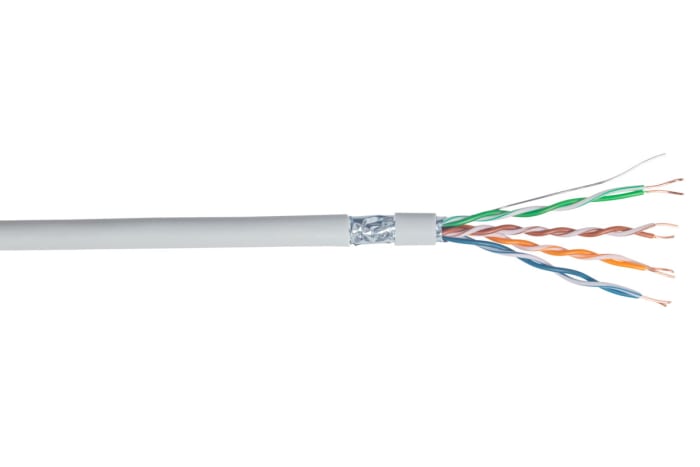RS PRO Cat5e Cable, F/UTP, Grey LSZH Sheath, 305m, Low Smoke Zero Halogen (LSZH)

Technical Document
Specifications
Brand
RS ProLength
305m
Terminated/Unterminated
Unterminated
Shield Type
F/UTP
Outer Sheath Material
LSZH
Sheath Colour
Grey
Fire Behaviour
Low Smoke Zero Halogen (LSZH)
Conductor Strand Type
Stranded
Cross Sectional Area
0.2 mm²
Voltage Rating
125 V
Outer Diameter
6.2mm
American Wire Gauge
24 AWG
Standards Met
EN 50173 EN 55022.
Cable Shape
Multicore
Country of Origin
Italy
Product details
RS Pro Category 5e C305 m FTP cable
Category 5e cable to handle frequencies up to 100 MHz.
Features and Benefits
·Aluminium tape shielding
·Supplied in a 305 metre dispenser, for easy on-site transport and use
·Weight: 46 kg / km
Product Application Information
This Cat5e cable can be used in horizontal and building backbone applications. It supports current and future Category 5e applications, such as: 1000Base-T (Gigabit Ethernet), 100 Base-T, 10 Base-T, FDDI and ATM.
Why choose Cat5e over Cat5 cables
Cat5 and Cat5e are virtually identical and cannot be told apart by thickness, colour or material. Cat5e cables sometimes have a more durable protective jacket making them suitable for use for many more years than a Cat5 cable. Within the jacket the wiring inside tends to be much tightly twisted making them more resistant to crosstalk.
Cat5e cables are able to support networks that run up to 1 gigabyte per second making them ideal for use within IT where the fast transference of data is essential.
Cat5e cables also have a higher bandwidth of 350 MHz which means they can carry a lot more information from one system to another than Cat5 cables can.
What is crosstalk?
Crosstalk is the electromagnetic interference that occurs between cables when they are close to each other. This interference can lead to errors in data transmission.
Standards
EN 50173; EN 55022.
P.O.A.
1
P.O.A.
Stock information temporarily unavailable.
1
Stock information temporarily unavailable.
Technical Document
Specifications
Brand
RS ProLength
305m
Terminated/Unterminated
Unterminated
Shield Type
F/UTP
Outer Sheath Material
LSZH
Sheath Colour
Grey
Fire Behaviour
Low Smoke Zero Halogen (LSZH)
Conductor Strand Type
Stranded
Cross Sectional Area
0.2 mm²
Voltage Rating
125 V
Outer Diameter
6.2mm
American Wire Gauge
24 AWG
Standards Met
EN 50173 EN 55022.
Cable Shape
Multicore
Country of Origin
Italy
Product details
RS Pro Category 5e C305 m FTP cable
Category 5e cable to handle frequencies up to 100 MHz.
Features and Benefits
·Aluminium tape shielding
·Supplied in a 305 metre dispenser, for easy on-site transport and use
·Weight: 46 kg / km
Product Application Information
This Cat5e cable can be used in horizontal and building backbone applications. It supports current and future Category 5e applications, such as: 1000Base-T (Gigabit Ethernet), 100 Base-T, 10 Base-T, FDDI and ATM.
Why choose Cat5e over Cat5 cables
Cat5 and Cat5e are virtually identical and cannot be told apart by thickness, colour or material. Cat5e cables sometimes have a more durable protective jacket making them suitable for use for many more years than a Cat5 cable. Within the jacket the wiring inside tends to be much tightly twisted making them more resistant to crosstalk.
Cat5e cables are able to support networks that run up to 1 gigabyte per second making them ideal for use within IT where the fast transference of data is essential.
Cat5e cables also have a higher bandwidth of 350 MHz which means they can carry a lot more information from one system to another than Cat5 cables can.
What is crosstalk?
Crosstalk is the electromagnetic interference that occurs between cables when they are close to each other. This interference can lead to errors in data transmission.
Standards
EN 50173; EN 55022.
